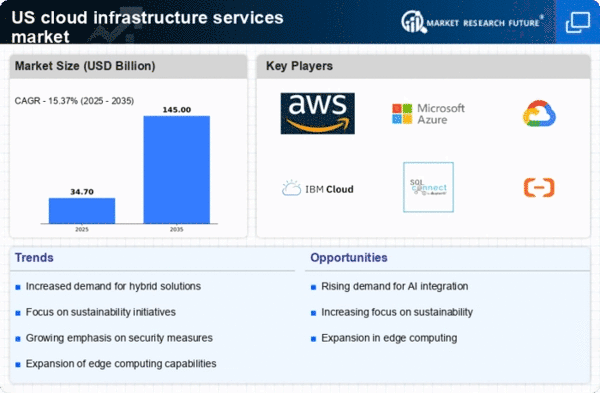Emergence of Edge Computing
The emergence of edge computing is reshaping the landscape of the cloud infrastructure-services market. As organizations increasingly adopt IoT devices and applications, the need for processing data closer to the source has become paramount. Edge computing allows for reduced latency and improved performance, which is essential for real-time applications. According to industry forecasts, the edge computing market is expected to reach $15 billion by 2025, indicating a substantial opportunity for cloud service providers to expand their offerings. This shift towards edge computing is likely to drive demand for integrated cloud infrastructure services that can seamlessly connect edge devices with centralized cloud resources. Consequently, the cloud infrastructure-services market is poised to benefit from this technological evolution, as businesses seek solutions that enhance their operational capabilities.
Growing Demand for Scalability
The The cloud infrastructure services market is experiencing a notable surge in demand for scalability solutions. Organizations are increasingly seeking flexible infrastructure that can adapt to fluctuating workloads. This trend is driven by the need for businesses to respond swiftly to market changes and customer demands. According to recent data, the market for scalable cloud services is projected to grow at a CAGR of 20% over the next five years. Companies are recognizing that traditional on-premises solutions often lack the agility required in today's fast-paced environment. As a result, cloud service providers are enhancing their offerings to include more scalable options, which is likely to attract a broader range of clients. This growing demand for scalability is a key driver in the cloud infrastructure-services market, as it enables organizations to optimize their resources and improve operational efficiency.
Shift Towards Subscription-Based Models
The shift towards subscription-based models is transforming the cloud infrastructure-services market. Organizations are increasingly favoring pay-as-you-go pricing structures that offer flexibility and cost-effectiveness. This trend is particularly appealing to small and medium-sized enterprises (SMEs) that may lack the capital for large upfront investments in IT infrastructure. Recent data suggests that subscription-based cloud services are expected to account for over 60% of the market by 2027. This model allows businesses to scale their services according to their needs, reducing the financial burden associated with traditional purchasing methods. As a result, cloud service providers are adapting their offerings to align with this demand, further propelling growth in the cloud infrastructure-services market.
Regulatory Compliance and Data Sovereignty
Regulatory compliance and data sovereignty are increasingly becoming critical factors influencing the cloud infrastructure-services market. As organizations navigate a complex landscape of regulations, such as GDPR and CCPA, they are compelled to ensure that their data management practices align with legal requirements. This has led to a heightened demand for cloud services that offer robust compliance features. Recent surveys indicate that over 70% of organizations prioritize compliance when selecting cloud service providers. Additionally, the need for data sovereignty is prompting businesses to seek local cloud solutions that adhere to regional regulations. This focus on compliance and data sovereignty is likely to drive growth in the cloud infrastructure-services market, as organizations strive to mitigate risks associated with data breaches and regulatory penalties.
Increased Investment in Digital Transformation
The The cloud infrastructure services market is significantly influenced by the rising investment in digital transformation initiatives across various sectors. Organizations are increasingly allocating substantial budgets to modernize their IT infrastructure, with a focus on cloud solutions. Recent statistics indicate that companies in the US are expected to invest over $500 billion in digital transformation by 2026. This investment is primarily aimed at enhancing operational efficiency, improving customer experiences, and fostering innovation. As businesses transition to cloud-based solutions, they are likely to require robust infrastructure services to support their digital initiatives. This trend underscores the importance of cloud infrastructure in enabling organizations to achieve their transformation goals, thereby driving growth in the cloud infrastructure-services market.
















